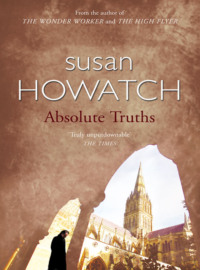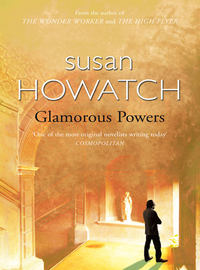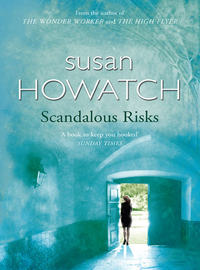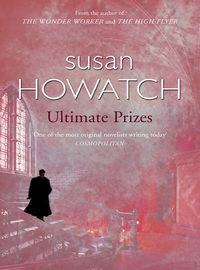
Полная версия
Mystical Paths
I was impressed by the Aysgarths’ popularity and even more impressed by their ability to remain unflurried by the numerous interruptions. A successful partnership, I thought, a well-suited couple. I forgot that obscure moment of tension between them at Marina’s party.
On the Sunday of my visit Christian showed me around his College and we attended matins in Christ Church Cathedral. It was after this that I felt sufficiently self-assured in his company to say: ‘Since you’re a church-goer, I suppose your decision not to be ordained had nothing to do with a loss of faith.’
‘I don’t usually go to church. But I happen to be fond of that Purcell anthem they sang this morning.’
I was so startled by this confession that I was glad he gave me no chance to comment. To tell the truth,’ he added, ‘I never intended to be ordained. I read theology just to please my father.’
Automatically I heard myself say: ‘But how on earth did you break the news to him that you weren’t going on to theological college?’
‘I said something like: “Brace yourself – tough news – I’m not going to be ordained.” And he said: “Oh dear. Never mind, we can’t all be Archbishop of Canterbury. Have a drink and tell me what you intend to do instead.”’
‘What a fabulous father!’ I exclaimed impressed, but Christian merely said: ‘I doubt if he was surprised. I think he’d already worked out that my decision to read theology was my way of discharging any filial obligation I had to follow in his footsteps.’
‘Even so,’ I said, ‘he took it very well. If I decided not to be ordained, I believe my father would sink into a depression and die.’
‘What about your mother?’
‘She –’
‘Oh God, no, I’m sorry, she’s dead, isn’t she?’
‘Yes, she died when I was fourteen.’
‘I was fifteen when my mother died,’ said Christian. ‘It was absolute bloody hell. However, at least your father never remarried. Count your blessings.’ And when I heard the edge to his voice I knew he hated his stepmother.
I heard from her three weeks later. I was at home, trying to work out how I could trade in Lynda (my first girl, acquired in a frenzy the previous summer after my encounter with Marina in the punt) and take on something with longer legs. I was just fantasising for the umpteenth time about Dinkie when Morgan, one of the Community, banged on the door of my private sitting-room and said: ‘The intercom’s not working and that crazy wife of the Dean of Starbridge is on the phone screeching for you. Are you in or out?’
I opened the door. Morgan was an ex-pop-singer who was now trying to write an opera about God in order to justify the free meals which he received as a member of the Community, but I didn’t mind him. He was harmless. The members of the Community who drove me up the wall were Rowena and Agnes, the wives of the ex-monks, Mark and Luke. I detest bossy old bitches who think priggishness is part of the Christian way of life.
‘Okay, I’ll take the call,’ I said, intrigued by Morgan’s news, and moved to the bedroom, where I kept the phone.
‘Nicholas my dear,’ said Mrs Dean the instant I announced my presence, ‘this is Dido Aysgarth – as that peculiar man who answered the phone may or may not have told you, and really, I can’t think why your father has to surround you with a bunch of cranks instead of engaging some motherly soul who would be a proper housekeeper, but then there’s the problem of the garden, isn’t there, and gardeners are almost impossible to obtain nowadays as I well know. Nevertheless it seems unwise to rely on religious maniacs, such a tragedy your mother died young, although she worked so hard running that estate that it’s hardly surprising she had a massive stroke and personally I think women should stick to being wives and mothers and leave the masculine work in this world to men – and talking of men, my dear, Christian’s coming down next weekend with his family and since he’s taken a fancy to you he’s insisting that I invite you over for Sunday lunch, and I thought what a good idea because it’s years since you’ve seen Elizabeth and although she’s only fourteen she’s very mature – and in my opinion quite ravishing as well as utterly brilliant – but of course I’m prejudiced as I’m her mother, and talking of parents, I almost hesitate to ask for fear of hearing bad news, but how is that poor old father of yours?’
‘Very well.’
‘So sad your mother’s death unhinged him. All right, Nicholas, we’ll look forward to your visit, Christian will be so –’ And she hung up, cutting herself off. Probably she continued to talk even after the receiver had been replaced.
It says much for my desire to see Christian that I turned up at the Deanery despite the outrageous style of the invitation. Unfortunately I at first had no chance to talk to him. Mrs Aysgarth was ruthless in clamping down on my efforts to escape from Nymphet-Elizabeth, Starbridge’s very own version of Lolita, and when I did succeed in heading for the seclusion of the lavatory, Sandy-the-Greek-Freak waylaid me in the hall. I was just wishing I were a hundred miles away when Christian came to the rescue and bore me off for a stroll around the Close.
As we passed the South Canonry where the Ashworths lived he said: ‘Are you really psychic or is that just a fantasy of Marina’s?’
‘I get a bit of foreknowledge occasionally.’
Hearing my guarded tone he realised I was nervous of ridicule and at once he sought to reassure me. ‘I ask purely out of friendly curiosity,’ he said, ‘not hostile scepticism.’
‘I’m not good at talking about it. In fact my father says I shouldn’t talk about it, because in his opinion there are many futures and not all of them come true. You’ve got to allow for man’s free will, you see, so when I do experience foreknowledge –’ I repressed a shudder at the memory of Marina’s party ‘-I always have to remind myself that the disclosed future may never happen.’
‘But presumably it does sometimes happen, and that’s extraordinary in its implications, isn’t it? It would seem to support Plato – to suggest that the world we know is only the shadow of another world, the real world where all time is eternally present. How can one see the future unless time, as it’s popularly understood, is an illusion? What a kick in the teeth for modern philosophy, refusing to acknowledge any reality other than the one we perceive with our senses!’
‘My father says modern philosophy is wholly unreal, just the spirit of the Enlightenment reaching its inevitable dead end. My father says the logical positivists prove only one thing: that it’s possible to have a brilliant intellect and still wind up a spiritual ignoramus out of touch with ultimate reality.’
‘I’d like to talk to your father,’ said Christian, ‘but I hear he doesn’t see anyone new nowadays.’
‘Oh, he’d see you, I’m sure,’ I said at once, ‘if I were to ask him.’
Would he? Then if you could mention my name I’d really be most grateful. Like the spirit of the Enlightenment, I seem to have reached a dead end.’
I stared at him in astonishment, and when he saw my expression he said rapidly: ‘I’ve got everything a man could wish for, of course. But I feel I need a wise man like your father to give my life a new direction for the future.’
This statement at least I could understand. Anyone could benefit from skilled spiritual direction, even those whose lives were successful and happy. My father had never confined himself merely to counselling the troubled in order to help them to pray; a considerable part of his ministry had consisted of advising those who were doing well in their journey along the spiritual way and wanted to sustain their progress. So I didn’t automatically assume that Christian had severe personal problems. In fact I thought it far more likely that he had reached a point where his secession from the Church bothered him and he was keen to re-examine whatever beliefs he still retained.
‘I’ll speak to my father as soon as I get home,’ I promised, pleased by the opportunity Christian had given me to repay his kindness, but to my dismay my father refused to see him.
‘I’m not interested in Aysgarth’s over-educated sons who are now finally realising that intellectual prowess is no substitute for spiritual growth.’
‘But Father –’
‘I’m over eighty,’ said my father crossly, ‘I’m retired and nowadays I see only the people I want to see. However –’ Realising that he was behaving like a very stubborn, tiresome old codger he made a big effort ‘– I’ll write Christian a letter referring him to the Fordites at Grantchester. Since they’re so close to Cambridge the monks there are well accustomed to helping clever men who have lost touch with their souls.’
‘I don’t think he’s lost touch with his soul. He just wants advice on shaping his future.’
‘When someone talks about reaching a dead end you can be certain his soul’s well out of reach of his fingertips,’ said my father tartly, and pottered off to his little kitchen to prepare Whitby’s evening fish.
I was so embarrassed by my failure to secure Christian an audience that I made no attempt to contact him, but in September, just as I was preparing to return to Cambridge for my final year, I received a phone call from his friend Perry Palmer in London.
‘I’m throwing a party on the Saturday after next,’ he said pleasantly. ‘Any chance you’ll be able to come? Marina and the gang will be there so you won’t be entirely marooned among old fogeys in their mid-thirties like me.’
I felt sure Christian had prompted the invitation. ‘Thanks, Perry,’ I said. ‘Great.’ As an afterthought I added warily: ‘Elizabeth Aysgarth won’t be there, will she?’ but Perry answered with a laugh: ‘No, I don’t go in for nymphets!’
I then had to work out where I could stay the night. On previous visits to London I had stayed with the Fordite monks in the guest-wing of their headquarters near Marble Arch, but I knew from past experience that the guest-master became stroppy if I stayed out late. I decided I was tired of stroppy guest-masters, tired of my father behaving as if London were one big moral cesspit, tired of being treated as anything less than a fully-grown adult male.
‘I’ll stay with one of my friends,’ I said to my father.
‘That’s not acceptable to me, Nicholas. If you’ve got to go to London, you must stay with the monks.’
‘But that’s such a pain in the neck!’
We eyed each other balefully. This was the danger zone where the generation gap yawned and my desire to be independent in the manner of the 1960s clashed with my father’s antiquated ideas about what was proper for a young man of twenty.
‘If you refuse to stay with the Fordites,’ said my father, ‘then you must stay with Martin. He’ll look after you.’
‘I don’t need looking after! Maybe I’ll cadge a corner in Michael Ashworth’s pad – surely you can’t object if I stay with a bishop’s son!’
‘You may stay with Charley but not with Michael,’ said my father, who had somehow found out that Michael had been chucked out of medical school for laying every nurse in sight. ‘However, I must say that I don’t approve of this modern habit of scrounging hospitality, and in my opinion you should always wait to be invited before you turn up on a friend’s doorstep and put him to a certain amount of inconvenience. With members of one’s family, of course, it’s different. They have a duty to provide for you, but even so, a thoughtful, unselfish man will be scrupulous in trying not to impose himself on any household merely in order to make his life easier.’
Hopeless old Victorian. ‘People are more casual nowadays, Father.’
‘Yes, I’ve noticed the decline in good manners over the last half-century. Now, Nicholas, why don’t you approach Martin before you approach Charley? I’d really feel much happier if –’
‘The last thing I’m going to do is stay with that old creep!’
Bad move, Nicholas. Bad, bad move. But the old man was driving me up the wall. Taking a deep breath I tried to grab some patience out of thin air. Mustn’t upset the old boy. If he had a stroke and died –
‘Father, I’m sorry, I didn’t mean to sound so rude, the words just sort of slipped out, but you see, Martin and I … well, I mean … okay, I know we’ve got you in common and I know he’s a good son, coming down here regularly and gushing all over you, and I’m sure you’re right when you say he has many fine qualities, but … he’s so old, you see, and not quite my sort of person, and –’ I stopped before saying the words ‘I can’t stand him’ but my father heard them anyway as they flashed across my mind.
‘I’m extremely disappointed by that speech,’ he said in the kind of voice priests use for funerals. ‘You’ve upset me very, very much.’
I wanted to smash something. ‘Oh, I’m sorry, I’m sorry …’ But I knew as I spoke that there was only one way of putting things right. Off I sloped to telephone my half-brother.
‘Don’t worry, Martin, I’m sure it’s quite impossible – I know how busy you are –’
‘Not too busy to help you out.’
‘I’ve refused to stay with the Fordites because they don’t understand about late-night parties, and Father said I had to stay at your flat, but since I wouldn’t dream of foisting myself on you –’
‘Foist away.’
‘– there’s no need for you to issue an invitation. I just have to tell Father, you see, that I’ve approached you but you can’t help. Okay, Martin, sorry to have troubled you, ’bye.’
I then phoned Charley-the-Prig Ashworth, who had been ordained that summer and was now working at St Mary’s church in Mayfair.
‘I hate to make demands on your Christian charity, Charley,’ I said, ‘but can I sleep on your floor on Saturday week?’
‘Of course you can! I admit it is a little tricky because we’ll have four student Christians from Africa staying in the curates’ flat then, but I’m sure we can find you a quiet corner somewhere –’
I didn’t fancy student Christians from anywhere. ‘It’s okay, Charley, I’ll try Michael.’ I could always insist to my father that Michael had turned over a new leaf.
‘I don’t think you’d be terribly welcome there, old chap. He’s got a new girlfriend who always seems to be around to answer the phone. Talks with an American accent and sounds as if she can’t wait to be censored by the Lord Chamberlain.’
‘Gosh, not Dinkie!’
‘You know her?’ Charley was suddenly very cool.
‘She’s a friend of Marina Markhampton’s.’
‘Honestly, Nick, I think you ought to watch it – that’s a very fast crowd. Look, come and stay at the flat – you can have my bed. I’ll kip down with the Africans in the living-room.’
The thought of being ‘saved’ by this evangelical crusader of unimpeachable virtue was enough to make me want to puke.
‘No, don’t worry, Charley, I’ll go to the Fordites.’ I phoned Martin again. ‘Sorry to keep bothering you, but –’
‘– but the old man’s putting on his crucified look and you’re at your wits’ end.’
‘Don’t you speak of my father like that!’ I yelled, finally driven to the luxury of venting my rage.
‘He’s my father too, you know! Look, sonny, I don’t know what your problem is, but –’
‘Stop talking to me as if I was six!’
‘Then stop behaving as if you were two! I’ll see you on Saturday week – let me know what time you’ll be arriving,’ said Martin, and hung up.
I decided I loathed everyone over thirty. Then I remembered Christian and amended thirty to forty. After that decision I found myself wondering how Michael had managed to convert Dinkie into his live-in telephone receptionist. Did his father know? And what could the Bishop have said once he had recovered from his apoplectic fit? Was it possible that Michael could pass Dinkie off as a ‘nice girl’ and take her home to the South Canonry for visits? But no, Dinkie couldn’t be passed off as anything but a siren, and Uncle Charles, being a man of the world, would recognise her type even at a distance of fifty paces. Surely Michael wouldn’t dare tell his father! But how could he be sure Charley-the-Prig wouldn’t split on him? And I thought I had problems, scrabbling around once a week with Lynda! It was consoling to know that some sons of priests lived even more dangerously than I did.
For a second I remembered my premonition that Dinkie would wind up as a walking corpse, but I blotted that memory right out by repeating my father’s familiar words of comfort: ‘There are many futures and not all of them come true.’ I had long since decided that Christian wasn’t going to die young. That particular premonition had been just a false blip on the screen, a stress reaction after the exceptionally gruesome psychic experience I had suffered minutes earlier.
I began to look forward to seeing him again at Perry’s party.
II
My father said I had to take Martin a small present to signal my thanks for his hospitality so I bought some oranges from a barrow-boy at Waterloo station. Martin, a reformed alcoholic, regarded freshly-squeezed orange juice as a big treat. When I arrived at his flat in Chelsea he had just returned from a rehearsal at the theatre. A revival of Noel Coward’s Present Laughter was due to open in the West End shortly after a successful trial run in the provinces. My father and I had seen the production at the Starbridge Playhouse.
‘Oranges!’ exclaimed Martin as I mutely shoved the bag at him. ‘How clever of you!’
I tramped along behind him into the spare bedroom where the wallpaper, curtains and bedspread all matched. The whole flat had this same manicured, expensive look, conjuring up images of a high-class tart. In the living-room middle-brow books sat on white shelves. Nasty examples of modern art leered from the walls. Signed photographs of show-business luminaries, all professing undying love, were positioned at various strategic points so that it was impossible to look anywhere without seeing a famous face who allegedly adored Martin. Below the middle-brow books were the middle-brow records where the noises of Frank Sinatra, Dean Martin and Peggy Lee were lavishly represented. The current copy of Variety lay open on the coffee table. On the desk were scattered provincial press cuttings, all proclaiming how wonderful Martin was in Present Laughter. I wandered around feeling like a creature from another planet and tried to work out how I could stay in my bedroom till it was time to go to the party.
‘Can I have a bath?’ I said in a moment of inspiration.
I soaked and I soaked and I soaked. Eventually Martin called: ‘You haven’t drowned, have you?’ and I had to get out. When I finally reappeared, dressed in my best jeans and my favourite blue shirt, Martin said: ‘A casual party, is it? Whereabouts do you have to go?’
‘Albany.’
This impressed him. Martin, whose mother had been working-class, was a snob. ‘You mean the Albany? Off Piccadilly?’
‘You don’t say “the” Albany. That’s not done. You just say “Albany”,’ I said, very much the son of Anne Darrow, née Barton-Woods, of Starrington Manor.
‘What’s good enough for Oscar Wilde is good enough for me, you little snob – look up the reference in The Importance of being Earnest! Who’s your host?’
‘A guy called Perry Palmer.’
‘Perry Palmer?’ Martin’s face, trained to express every conceivable emotion to every conceivable degree, now registered a profound astonishment. ‘What are you doing going to one of Perry’s parties?’
I was equally astonished. ‘You know him?’
‘Not well, no, but we’ve friends in common – friends in the theatre. How on earth did the two of you meet?’
‘He’s a friend of Christian Aysgarth’s.’
‘Ah yes, the Starbridge connection – all is explained. But nevertheless, how extraordinary! If I were on stage I’d declare in my best sinister voice: “It’s a small world!” and a shiver would sweep through the audience!’
I experienced a moment of amnesia, as so often happens when one’s confused. ‘Have you met any of the Aysgarths?’
‘Almost the whole damned lot, yes – don’t you remember me telling you? When Present Laughter played in Starbridge recently Dean Aysgarth and that fantastically bizarre wife of his gave a party for the cast.’
‘So they did, I remember now. And Christian was there, wasn’t he – he came down specially from Oxford –’
‘And Perry came down specially from London. Tell me, who else is going to this party of his tonight?’
‘Oh, various people I know.’
‘Girls?’
‘You bet.’
‘Thank God!’ said Martin. ‘For one ghastly moment I thought I’d have to come to Albany to chaperone you, and all I want to do after that rehearsal is put my feet up and watch the box.’
‘Are you trying to tell me –’
‘Perry moves in certain circles, yes. God, what a relief it is to live like a monk! I never thought I’d hear myself say it, but when one gets to the advanced age of fifty-eight, the thought of performing in bed as well as on the stage is simply too exhausting to contemplate, and now I find I’m hopelessly hooked on the delights of living alone.’ He laughed before adding: ‘Getting like Dad, aren’t I? No wonder he’s decided I’m a fit person to keep an eye on you when you come trundling up to London! I’ve even started to go to church. They do a first-class show at St Mary’s Bourne Street – brilliant stagecraft enhanced by the English lust for ceremonial! I’m wild about the whole gorgeous circus.’
‘Yeah,’ I said. ‘That type of Anglo-Catholic ritualism has always appealed to people like you.’ I stood up. ‘I’ve got to go.’
‘Well, watch yourself with Perry Palmer,’ said Martin smoothly as the conversation degenerated into a verbal punch-up. ‘Psychics are usually attractive to both sexes. I bet Dad’s had plenty of men in love with him in his time.’
‘The most irritating thing about homosexuals,’ I said, heading for the door, ‘is that they believe everyone’s secretly homosexual. A true triumph of hope over statistics.’
‘That’s a great exit line!’ cried Martin, genuinely amused, but I walked out without looking back.
III
I took the tube to Green Park and wandered down Piccadilly to Albany, that fabulous ex-palace where the waiting-list is about twenty years long and no one gets a ‘set’ of rooms unless they have a personal hotline to a bunch of nobs who appear to be less well-known than the Queen but more influential. How Perry had acquired this flat of his I had no idea. His grandmother was supposed to have been Edward VII’s mistress, but a lot of women were supposed to have been Edward VII’s mistress and presumably not all their grandsons had ended up in Albany. Anyway, there Perry lived in a ground-floor set that faced the Rope Walk, and there was I in the September of 1963 padding past the uniformed flunkey in the grand entrance hall.
Perry was a spy. Now that I had been informed that he was also a homosexual I thought: how typical! Apparently the Foreign Office had learnt nothing from the Burgess and Maclean affair. Then I remembered that it was only rumoured he was a spy; all that was known for certain was that he spoke fluent Russian and held some Foreign Office post which he refused to discuss. Possibly he just translated incoming mail from the Kremlin.
I had been bothered by Martin’s revelations about Perry, but during my journey to Albany I became less bothered and more sceptical. Martin had denied knowing Perry well. It seemed obvious in retrospect that he’d rushed to judgement after seeing Perry carousing with a certain bunch of actors, but just because Perry dabbled in the social side of the acting profession in order to give himself a break from the tight-lipped job at the FO I didn’t have to conclude he had a sex-life, lawful or unlawful. In fact Marina always said Perry was a eunuch. Perhaps he was just undersexed. Certainly I couldn’t see Christian being close friends with an active homosexual. That didn’t add up.







